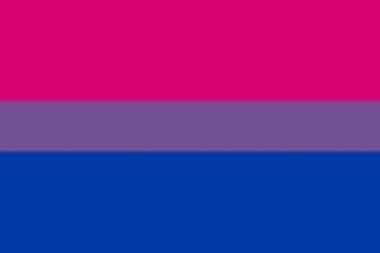Bisexuality and “being normal”

by Harrie Farrow
BiAngle Columnist
Often bisexuals make remarks about how freeing it was when they came out, and often they express surprise at this. These brave souls experienced so much angst about the firestorm they expected to walk into when they came out, that they hadn’t been able to give clear thought to what it would mean when the firestorm that has been raging within is at last squelched.
Bisexuals finally come out often because for too many years they have been engaged in fierce battle, and it got to the point where they were no longer willing to fight. Who has their foe been? Themselves. They had waged a war against their true nature. Why they did this, of course, comes down to social pressure due to heteronormativity - the notion that heterosexuality is the only normal sexual orientation.
Now that homophobia is sharply on the decline, heteronormativity is being slowly replaced by a new perception of normal that affects bisexuals, the notion that a normal sexual orientation is one that consists of being attracted to only one gender - a concept which is increasingly being referred to in bisexual spaces as "mononosexual-normativity."
Being out as bisexual means being one’s authentic self; this requires flying in the face of these enormous pressures to deny our truths. In this society, we are not necessarily raised to believe that being authentic, or true to ourselves, should be a goal, in fact quite to the contrary if it means going against social norms. Most of us are, in fact, raised to believe that “fitting in” is essential. The messages we get as a child are that being part of the norm should come easily and naturally, and if it doesn’t, we should want to do everything we can to get there.
However, bisexuals cannot “become straight,” despite biphobia that insists the contrary, they can only try to ignore their non-straight desires. When this effort fails, or proves to be exhausting, bisexuals often then attempt to conform to the norms of a sub group of society — the gay community — only to find this too feels false and is ultimately impossible.
Just as they cannot become straight, bisexuals cannot “turn gay” either, despite how often both gay and straight society may insist otherwise. All this tends to translate to years of stress and anger, which not infrequently lead to drug abuse, and mental health issues.
Conformity to norms in many ways is a useful construct. Certainly, it’s best if we all agree to stop at red lights, respect personal space, and dispose of trash in designed receptacles. However, there is a difference between prescribed conformity for social function and safety, and demands for conformity that are not only unnecessary but also dismiss the personal realities of some of those outside the majority. What is socially acceptable changes over time – witness same-sex marriage rights. How these changes in perception happen, often involves what is at the time seen as subversion, and later understood as acts of bravery.
Yes, coming out as bisexual is an act of bravery, yes it means giving up on conforming to social constructs such as heteronormativity and mononormativity, but being out as bisexual means being authentically one’s self, and that — and only that —is what is normal for a bisexual.
Once a bisexual embraces their normal, and makes it clear that they expect others to accept it, then yes, of course they feel a new found freedom — a peace treaty has finally been declared in the war they’ve waged on themselves.
If you are bisexual and out, congratulations! If you are bi and closeted and cannot safely come out, please take any steps you can to make that journey easier, and please know that the bi community feels for you. If you can safely come out, is it time for you to raise the white flag and ease your burden by surrendering to your normal?
If you are gay or straight, and a true ally, thank you! If you are gay or straight and in anyway biphobic, it’s long past time for you to stop contributing to the problem, and instead help create a more hospitable environment to allow bisexuals less stress in finding the freedom of embracing their normal.
Terminology such as “monosexual-normative” and “heteronormativity are terms used by this writer and are not standard terms according to the Associated Press or the National Lesbian & Gay Journalists Association or widely accepted in journalism.
The Gayly – September 22, 2015 @ 11:25am.





